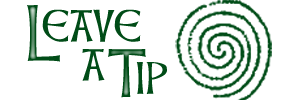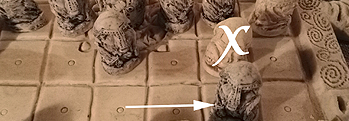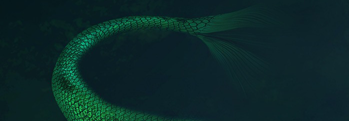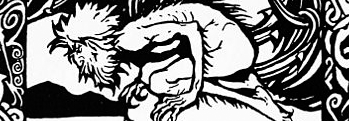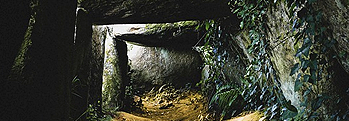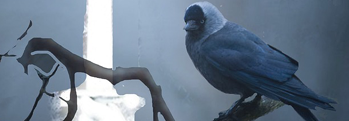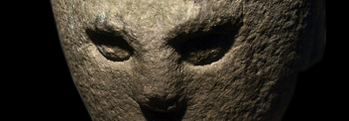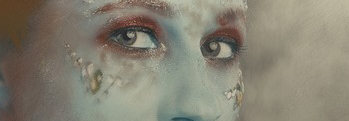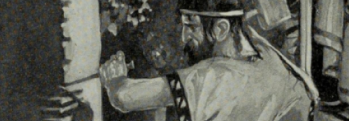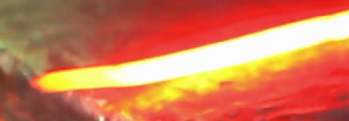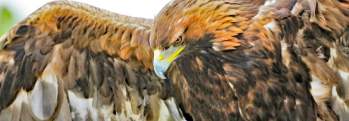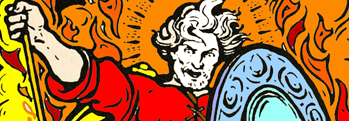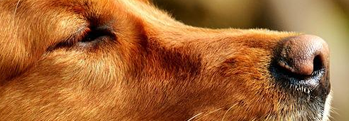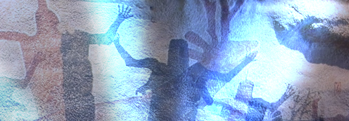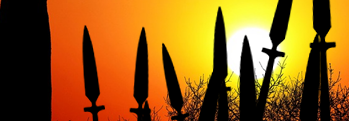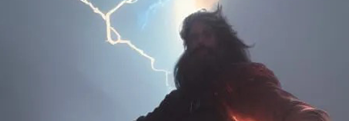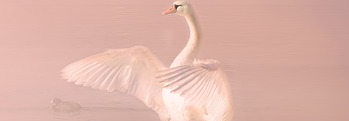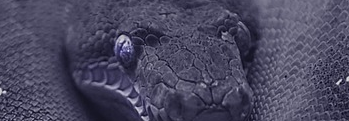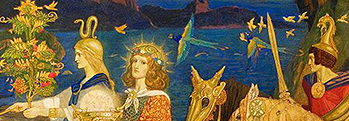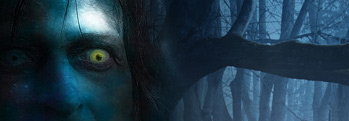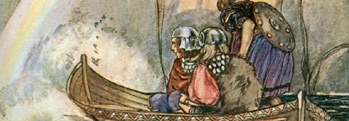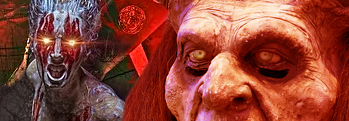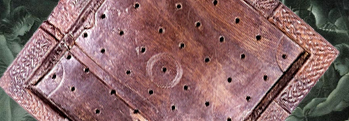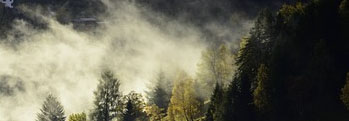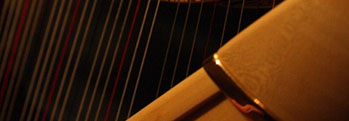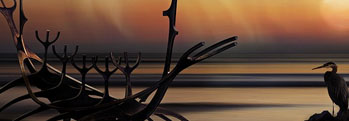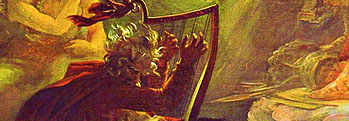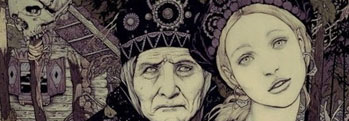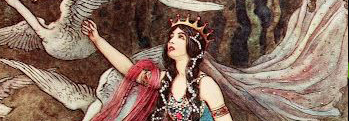The Children of Turenn
Irish and Celtic myths and legends, Irish folklore and Irish fairy tales from the Mythological Cycle
The Grim Fate of the Three Sons of Turenn
 Long ago it was the time of the Tuatha De Danann in Ireland, and they were troubled by strife from beyond the Emerald Isle and within it. One of their mightiest warriors whose name was Lugh of the Long Hand heard that their demonic enemies from the sea, the Fomorians, had landed at Eas Dara, so he hopped up on Aonbharr, a horse which could gallop across the waves as easily as the fields. He went as swift as the wind to Tara to speak with Nuada, the King of all Ireland.
Long ago it was the time of the Tuatha De Danann in Ireland, and they were troubled by strife from beyond the Emerald Isle and within it. One of their mightiest warriors whose name was Lugh of the Long Hand heard that their demonic enemies from the sea, the Fomorians, had landed at Eas Dara, so he hopped up on Aonbharr, a horse which could gallop across the waves as easily as the fields. He went as swift as the wind to Tara to speak with Nuada, the King of all Ireland.
He asked the king for help to fight back the invaders, who had already pillaged across the lands of Bodb Dearg, but Nuada wasn't really interested since he himself was cautious of the power of the Bodb, and perhaps saw it as no bad thing that he was kept occupied with Fomorian invaders!
Frustrated, Lugh rode westwards, where he met three armed men of intimidating aspect, and he saw they were the three sons of Cainte, one of whom was his own father.
He told them his tidings and asked what help they would give to him - "Each one of us will keep off a hundred from you in the battle," said they. "That is a good help," said Lugh, "but there is a help I would sooner have from you than that - to gather the Riders of the Sidhe, the grim warriors of the mounds, to me from everywhere they ride!"
And so each of the three set off in a different direction, with Lugh's father Cian going to the north. To his dismay however, not long after he saw three more warriors before him - the sons of Turenn, who was himself the son of Ogma!
Fell handed warriors they were and Cian wished his two brothers were with him, for there were old grudges and much hatred between the sons of Turenn and the sons of Cainte. Luckily he had with him a druid wand and tapped himself, so changing into the shape of a pig and mingling with a nearby herd, safe and hidden.
Or so he thought, but he thought wrongly! For the sons of Turenn were not only deadly warriors, they were keen eyed hunters too, and they wondered greatly where the solitary man they had seen was gone. Two of them were dismayed for they knew they'd have to slaughter the whole herd to find him, which would start a feud with the entire Tuatha De Danann, but Brian son of Turenn laughed.
“Badly taught you were by the druids” he said, and tapped them both with his hazel druid-wand, turning them into hounds, and quick as you like they leapt upon and seized the enchanted pig!
Breaking free, the pig made for the edge of a nearby wood but before it could escape entirely, Brian threw his needle-pointed spear and pierced the pig through the body. As it began begging for mercy in a human voice, the sons of Turenn demanded to know who it was in the shape of a pig. He revealed himself as Cian, which only made Brian less inclined to mercy!
Cian made one request then, and that was to allow him to resume human form before the final blow was struck, and the sons of Turenn agreed, finding the killing of people more to their taste than butcher's work.
With that Cian laughed, saying “if it was in the shape of a pig you had killed me there would only be the blood money for a pig to pay. But as it is in my own shape you will kill me, there never was and never will be any person killed for whose sake a heavier price will be paid than for myself. And the weapons that kill me will confess to my son.”
Well believing him and knowing the enchanted ways of the Tuatha De Danann, Brian decided to finish him off with stones, and they pelted him until there was nothing left but a broken and bloody mess.
But when they tried to bury him, his prophetic words returned with great power, for the earth itself, the implement of his destruction, spat him back out! Five times and one they tried to bury the body, but the earth wouldn't hide their murder, and only on the the seventh attempt it finally settled over the body.
And so with brass they went to help Lugh in the battle against the Fomors.
 Lugh had gone to the camp of the Fomors in Connacht and found them sitting on great heaps of treasure and wealth looted from Bobd Dearg, the son of the Dagda. Without a concern he came to them, but no weapon was raised against him for his power was well known, and he was himself half Fomor. He demanded half the cattle they had taken for himself, but they mocked and scorned him.
Lugh had gone to the camp of the Fomors in Connacht and found them sitting on great heaps of treasure and wealth looted from Bobd Dearg, the son of the Dagda. Without a concern he came to them, but no weapon was raised against him for his power was well known, and he was himself half Fomor. He demanded half the cattle they had taken for himself, but they mocked and scorned him.
Nonetheless he made camp near them for three days and nights without harm, when suddenly from the old oak forest emerged Bobd Dearg and with him an army of thousands of Sidhe.
“Why haven't you defeated these Fomors already?” asked the Bodb, and Lugh told him he had to leave some for the Sidhe!
So battle was joined, and a bloody affair it was, but the Sidhe had the best of it with their shining weapons and stout shields. So hot and hard were blows struck that night was turned to day with the sparks flying, and many a hero met his end, where the Morrigan ate her fill and even the battle demons fled the dance of infernal sorcery and bitter razor-bronze.
Yet after the battle when peace had been made with the survivors, Lugh cast about looking up and down, east and west for his father, but he couldn't find him. Nobody knew where he was! Himself and the Sidhe-host tracked back to where he had parted from Cian and then tracked his father's trail northwards.
Sure enough, when he came to the place of the murder, the earth itself spoke the sorry tale to him, and that he had died as a man and not a pig. Lugh and the Riders of the Sidhe dismounted and dug to find the remains of Cian, and saw the way he had been slain.
“It was the death of an enemy the sons of Turenn gave my dear father,” said Lugh, swearing himself struck blind and deaf with grief, kissing the ruined corpse three times, knowing in his heart that the people of Danann and Ireland would know no peace from that day forward, for treachery against one another had been sown.
And there was truth in that, for as the saying goes, “where one Irishman roasts, two more will show up and turn the spit”.
Cian was buried beneath the earth and a tall stone was raised above his body, and his name was marked on it in the old way. Once this was done, Lugh swore vengeance on the children of Turenn and their children, but warned the Riders of the Sidhe to hold their whist and let him deal with it in his own fashion.
They went then to Tara, to the court of High King Nuada, and saw there the sons of Turenn.
Lugh's face was pale and clam, and he bade the Sidhe to shake the chain of silence that he might speak and be heard.
“Tell me, sons of Turenn,” he said “what revenge would you take on the men that killed your father?”
Well I can tell you, the silence was such that grain of sand could be heard rolling! The chiefs of the Danann looked at one another and one asked if it was Lugh's own father that had been killed.
“It was,” he said, “and I know the three who killed him are in this house, and I know as well as they the means of the killing!”
There was a great murmuring among those gathered, then the king spoke.
“Such men I wouldn't kill in one stroke,” he said solemnly, “but rather I'd cut off one of their limbs with each passing day, and have them look upon what had been done, to better know their ruin,” and all agreed, including the sons of Turenn.
Lugh's voice spoke out, silencing them all.
“I tell you now, those three are here in this house, and although I won't break the king's peace, they will not leave until I have had satisfaction.”
“If it was I myself who had killed your father,” said the king agreeably, “I wouldn't hesitate to pay.”
 And the sons of Turenn glanced at each other askance and whispered, “well he knows and well he speaks of us – and it would be as well for us to come clean while we still can, before all the gathered chiefs, to avert treachery later!”
And the sons of Turenn glanced at each other askance and whispered, “well he knows and well he speaks of us – and it would be as well for us to come clean while we still can, before all the gathered chiefs, to avert treachery later!”
So Brian the eldest son cleared his voice and stood, saying “I know you're speaking of us, Lugh, since we've had trouble with the sons of Cainte before, but I tell you that we didn't do it. However since your mind is set we'll pay the price as if we had, and call the matter closed.”
“A price it is,” said Lugh in a strange voice, “and if you find it too heavy I'll let you off a share of it.”
“Three apples, and the skin of a pig, a spear and two horses, and a chariot, seven pigs, a dog’s whelp, and a cooking-spit, and three shouts on a hill. That is the fine I am asking,” he said, “and if it is too much for you, a part of it will be reduced, and if you do not think it too much, then pay it.”
“It is not too much,” said Brian cautiously, “or a hundred times as much would not be too much. And we think it likely,” he said, “because of its smallness that you have some trick planned.”
“I do not think it too small a price” said Lugh, “and I give you the oath of the Tuatha de Danann I will ask for nothing else, and I will be faithful to you, and let you give the same pledge to me.”
“Is our own word and agreement not enough?” asked Brian.
“No,” said Lugh, “for it is often the likes of you promised to pay a fine in this way, and try to back out of it later.”
So the sons of Turenn bound themselves by the King of Ireland, and by Bodb Dearg, son of the Dagda, and by the chief men of the Tuatha de Danann, that they would pay that fine to Lugh.
“Fair enough,” said Lugh, “and so I will tell you the specifics of the fine to be paid.”
“This is the way of it then,” said Lugh.
“The three apples I asked of you are the three apples from the Garden in the East of the World, and no other apples will do but these, for they are the most beautiful and have most virtue in them of the apples of the whole world.”
“And it is what they are like, they are of the colour of burned gold, and they are the size of the head of a child a month old, and there is the taste of honey on them, and they do not leave the pain of wounds or the feeling of sickness on anyone that eats them, and they do not lessen by being eaten forever.”
“And the skin I asked of you,” he continued, “is the pig skin of Tuis, King of Greece, and it heals all the wounds and all the sickness of the world, and whatever danger a man may be in, if it can but overtake the life in him, it will cure him. And it is the way it was with that pig, every stream of water it would go through would be turned into wine to the end of nine days after, and every wound it touched was healed.”
“And it is what the wizards of Greece said, that it is not in itself this virtue was, but in the skin, and they skinned it, and the skin is there ever since. And I think, too, it will not be easy for you to get it, with or without leave.”
“And do you know what is the spear I am asking of you?” he said. “We do not,” said they.
“It is a very deadly spear belonging to the King of Persia, the Luin it is called, and every choice thing is done by it, and its head is kept steeped in a vessel of poison, so it will not burn down the place where it is, and it will be hard to get.”
“And do you know what two horses and what chariot I am asking of you? They are the chariot and the two wonderful horses of Dobar, King of Siogair, and the sea is the same as land to them, and there are no faster horses than themselves, and there is no chariot equal to that one in shape and in strength.”
 “And do you know what are the seven pigs I asked of you? They are the pigs of Easal, King of the Golden Pillars, and though they are killed every night, they are found alive the next day, and there will be no disease or no sickness on any person that will eat a share of them.”
“And do you know what are the seven pigs I asked of you? They are the pigs of Easal, King of the Golden Pillars, and though they are killed every night, they are found alive the next day, and there will be no disease or no sickness on any person that will eat a share of them.”
“And the whelp I asked of you is Fail-Inis, the whelp belonging to the King of Ioruaidh, the Cold Country. And all the wild beasts of the world would fall down at the sight of her, and she is more beautiful than the sun in his fiery wheels, and it will be hard to get her.”
“And the cooking-spit I asked of you is a spit of the spits of the women of Inis Cenn-fhinne, the Island of Caer of the Fair Hair. And the three shouts you are to give on a hill must be given on the Hill of Miochaoin in the north of Lochlann.”
“And Miochaoin and his sons are under bonds not to allow any shouts to be given on that hill, and it was with them my father got his learning, and if I would forgive you his death, they would not forgive you. And if you get through all your other voyages before you reach to them, it is my opinion they'll kill you like the curs you are. And that is the fine I have asked of you,” said Lugh.
Silence fell in the great hall and darkness too, and the sons of Turenn, ashen-faced, decided to withdraw take the counsel of their father.
“That's bad news,” said Turenn, “and it will be the end of you! Only one such as Lugh could complete a quest like that, so it is his help you must ask if you are to survive. As he dwells yet in the king's house, he is bound by the laws of hospitality and must give some part of what he has if asked.”
“Go then and ask the loan of Manannan’s horse, the Aonbharr, from Lugh, and if he has any real desire to collect his price, and well he might for his war against the Fomors, he will give it to you. But if he does not, he will say the horse is not his, and that he would not give the loan of a loan.”
“Ask him then for the loan of Manannan’s boat, the Scuabtuinne, the unsinkable Sweeper of the Waves. And he will give that, for he is under bonds not to refuse a second request, and the currach will serve you better than the horse,” said the crafty old man.
They went back to Lugh and sure enough, he refused to give them the fairy-horse Aonbharr, but allowed them the use of the Wave Sweeper, bound as he was.
The came to Turenn to tell him the news, and found him lamenting and weeping with his daughter Ethne, who accompanied them to their boat. When he saw it, Brian began complaining about the small size of it, but Ethne answered sorrowfully.
“You ought not to be faulting the currach when the fault is your own,” said Ethne, “and oh my dear brother, it was a bad thing you did, to kill the father of Lugh of the Long Hand, and whatever harm may come to you from it, it is but justice.”
Then they pushed the currach out into the crystal clear waters of the Irish bay, and decided first to seek the apples. The currach did not neglect that order, but sailed forward over the green-sided waves and deep places till it came to its harbour in the east of the world.
The brothers conferred on how to best get the apples, for they were carefully guarded in a high and far garden. While two of the brothers wished to launch themselves straight in and attack, Brian said he'd rather not be remembered for his folly alone.
“Look you now” he said, “let me tap you with my Druid-wand and turn you into sparrowhawks, then we can all three of us swoop in and take an apple after the spears and darts of the defenders are spent, for they do not have bows or slings.”
It seemed like a good plan, and they lifted themselves aloft, flying towards the garden, where the watchers spotted them and shouted on every side. They threw showers of spears and darts, but the hawks kept out of their reach as Brian had bade them, till all the spears were spent, and then they swept down bravely on the apples, and brought them away in their claws without so much as a scratch!
 But the king of that land had three witch-wise daughters who transformed themselves into ospreys after word of the theft spread throughout the city, giving chase and sending flashes of lightning to scorch the brothers badly.
But the king of that land had three witch-wise daughters who transformed themselves into ospreys after word of the theft spread throughout the city, giving chase and sending flashes of lightning to scorch the brothers badly.
“We're in a bad way!” said the sons of Turenn, but Brian again tapped them with his Druid wand, turning them into swans, which eluded the ospreys and allowed the three to land on their boat.
Next to be pilfered was the pigskin held as a treasure by the King of Greece, and they decided to pretend they were poets, in case their notoriety had preceded them. So they tied up their hair in the manner of Irish poets and were greeted as equals by the aristocrats of the court, although they had not a poem between them and no knowledge of how to make one.
Well the king was only delighted to have two poets from the famed Isle of Poets visit his court, and he cast his gates wide to welcome them! All of his finery was laid out for he wished that they would speak well of him and the grandeur of his court.
The lads got to drinking and dining without delay, enjoying the many pleasures arrayed for their satisfaction. The king's poets recited their best compositions,and in response, Brian said to his brothers to entertain the king likewise.
“Don't ask us for a poem,” they said, “for we know only the poetry of the strength of our arms, and the brightness of our blades!”
“No kind of poem at all is that” said Brian dismissively, and stood to ask a hearing. The whole court was hushed as he cleared his throat:
“O Tuis, we do not hide your fame, we praise you as the oak among kings
the skin of a pig, bounty without hardness, this is the reward I ask for it.
The war of a neighbour against an ear, the fair ear of his neighbour will be against him
he who gives us what he owns, his court will not be the scarcer for it.
A raging army and a sudden sea are a danger to whoever goes against them.
The skin of a pig, bounty without hardness, this is the reward I ask, O Tuis.”
“A fine poem,” said the king, “but not a word of it do I understand!”
“The meaning is this,” said Brian, “King Tuis, we praise you as the oak is above the kings, the skin of a pig you own is what I would wish to get from you as a reward for my poem, and you and I will be by the ears about the skin, unless I get it with your consent!”
“A fine poem indeed,” said the king, “if only there wasn't so much concerning my pigskin in it. And it would seem poetry doesn't bring wisdom with it, for I will give that pigskin to nobody, however learned they may be! But look, I have no desire to offend three of the poets of Ireland so here's what I'll do. I will give you three times the fill of the pigskin in gold as the price for your poem.”
“You are a just and fair king,” said Brian, “but I alas am a greedy man, and would be satisfied only with seeing the pigskin filled with my own two eyes.”
“Measure it carefully first to myself and then to my brothers,” said Brian when they reached the treasure house, but when the skin was brought out, he grabbed it with his left hand and clove the servant next to him in two with a stroke of the sword in his right!
And then he kept a hold of the skin and put it about himself, and the three of them rushed out of the court, cutting down every armed man before them, so that not one escaped death or wounding.
Then Brian, filled with bloodlust, went to where the king himself was, and the king made no delay in attacking him, and they made a hard fight of it, and at the end the King of Greece fell by the hand of Brian, son of Turenn.
They rested then for a while, and after decided to seek from Pisear, the King of Persia, the deadly spear he owned. Pleased with the success of their subterfuge, they decided to try the same trick again, and when the time came for poems Brian rose up, and it is what he said:
“It is little any spear looks to Pisear
the battle of enemies are broken,
it is not too much for Pisear to
wound every one of them.
A yew, the most beautiful of the wood,
it is called a king, it is not bulky.
May the spear drive on the whole crowd
to their wounds of death.”
“That is a good poem," said the king, "but I do not understand why my own spear is brought into it, oh man of poetry from Ireland.”
“It is because it is that spear of your own I would wish to get as the reward of my poem,” said Brian.
“It is little sense you have to be asking that of me," said the king, "and the people of my court never showed greater respect for poetry than now, when they did not put you to death on the spot!”
Well Brian knew then the game was up, and he took an apple in his hand and flung it straight and true into the king's forehead, so that his brains were put out at the back of his head! Then himself and his brothers drew their swords and fought mightily until they had made an end of all they met of the people of the court. And then they found the spear, and its head in a cauldron of poison, so it would not set fire to the place.
 Again they rested after their red work, and debated what to do next. The balance of opinion was that they should go to the King of the Island of Siogair, a place that we today call Sicily, since he had the two horses and the chariot Lugh Il Dána had asked of them.
Again they rested after their red work, and debated what to do next. The balance of opinion was that they should go to the King of the Island of Siogair, a place that we today call Sicily, since he had the two horses and the chariot Lugh Il Dána had asked of them.
And so they packed the spear into the currach and set out with a sense of pride and achievement for all they had done. This time, they chose to claim they were wandering warriors of Ireland looking for an employer, and so they presented themselves on the plain before the king's house.
The king and the chief men that were with him rose up and came through the fair that was going on there, and they saluted the king, and he asked who were they. “We are trained fighting men from Ireland,” they said, “and we are earning wages from the kings of the world.”
"Is it your wish to stop with me for a while?" said the king. "That is what we are wanting," said they. So then they made an agreement and took service with him.
For two weeks and a month after they stayed in the service of that king, but no sign or sight of the horses and chariot did they have, much to their concern! So they decided to tell the king that unless they were given a look at the horses and chariot, they'd be packing their bags and heading on.
Brian went to the king and said, “It is because trained fighting men from Ireland, like ourselves, are always trusted by the kings they guard, and we are used to being told the secrets and the whispers of any person we are with, and that is not the way you have treated us since we came to you. For you have two horses and a chariot that are the best in the world, as we have been told, and we have not been given a sight of them yet.”
“I'd have shown them to you on the first day you cam,” said the king “if you had but asked! For such mighty warriors as yourselves neither I nor my people have yet seen.”
He sent for the horses and they were yoked to the chariot, and their going was as fast as the cold spring wind, and the sea was the same as the land to them. Brian was watching the horses closely, when suddenly he took hold of the chariot, smashed the driver against the nearest rock, leapt into his place, and threw the Persian spear at the king, straight through his heart! Then he and his brothers scattered the people before them and brought away the chariot.
“We will go now to Easal, the King of the Golden Pillars,” said Brian without delay, “to look for the seven pigs the Il Dánach bade us bring him.”
They sailed on then with great speed to that high country. The people of that country were watching their harbours for fear of the sons of Turenn, for the story of them had been told far and wide, how they had been sent out of Ireland by force, and how they were bringing away with them all the gifted treasures of the whole world.
Easal came to the edge of the harbour to meet them, and he asked was it true what he had heard, that the king of every country they had gone to had fallen by them. Brian said it was true, whatever he might wish to do to them for it.
“Why did you do all of that?”said Easal. Brian told him then it was the oppression and the hard sentence of another had put them to it, and he told him all that had happened, and how they had put down all that stood against them.
“What did you come to this country now for?” said the king. “For the pigs belonging to yourself,” said Brian, “to bring them away with us is a part of the fine.”
“What way do you think to get them?” asked the king.
“If we get them with goodwill,” said Brian, “we are ready to take them thankfully. And if we do not, we are ready to do battle with yourself and your people on the head of them, that you may fall by us, and we may bring away the pigs in spite of you.”
“If that is to be the end of it,” said the king, “it would be a pity to bring my people into a battle.”
“It would be a pity indeed,” said Brian.
Then the king whispered and took advice with his people about the matter, and it is what they agreed, to give up the pigs of their own free will to the sons of Turenn, since nobody had been able to stand against them up to that time.
Then the sons of Turenn gave their thanks to Easal, and there was wonder on them to have got the pigs like that, when they had to fight for every other part of the price. And more than that, they had left a share of their blood in every other place till then.
Easal brought them to his own house that night, and they were served food and drink, and good beds, and all they could wish for. They rose up on the morrow and came into the king’s presence, and the pigs were given to them.
“It is well you have done by us, giving us these pigs,” said Brian, “for we did not get any part of the fine without fighting but these alone.” He made a poem for the king then, praising him, and putting a great name on him for what be had done.
“Where to next, Sons of Turenn?” said Easal. “We are going to the country of Ioruaidh, on account of a whelp that is there.”
“Grant me one request,” said Easal, “and that is to bring me with you to the King of Ioruaidh, for a daughter of mine is his wife, and I would wish to persuade him to give you the whelp without a battle.”
“That will please us well,” they said.
So the king’s ship was made ready, and we have no knowledge of what happened till they came to the delightful, wonderful coast of Ioruaidh, that is today called Norway. The people and the armies were watching the harbours and landing-places before them, and they knew them at once and shouted at them.
Then Easal went on shore peacefully and going to where his son-in-law the king was, he told him the story of the sons of Turenn from beginning to end.
“What has brought them to this country?” asked the King of Ioruaidh.
“To ask for the hound you have,” said Easal.
“It was a bad thought you had coming with them to ask it,” said the king, “for the gods haven't made the heroes that could get my hound by force or by promise.”
“It would be better for you to let them have the hound,” said Easal,”since they have put down so many of the kings of the world.”
But all he could say was only the twittering of little birds to the king. So Easal went then to where the sons of Turenn were, and gave them the whole account. And when they heard the king’s answer, they made no delay but put quick hands on their weapons, and offered to give battle to the army of Norway.
There was a brave battle fought on both sides. The sons of Turenn made a fierce struiggle, but so savage were their blows that they chanced to become parted in the ebb and flow of battle, and Brian found himself alone, surrounded by enemies.
Although he was in a dangerous spot, Brian took it as a chance and leapt over the fence that had been built around the King of Ioruaidh, and the two champions fought until the king at last subsided.
Brian tied him up and brought him to Easal, saying “There is your son-in-law for you, and I swear by my hand of valour, it would be easier to kill him three times than to bring him to you once like this.”
So then the whelp was given to the sons of Turenn, and the king was unbound, and peace was made between them. And when they had brought all this to an end, they bade farewell to Easal and to all the rest.
Meanwhile rumours of their adventures had reached the ears of Lugh, and he was displeased that they had done so well. Long he brooded and listened to the croaking whispers of speaking stones, until at last he rose, and summoned his Druids.
 These he bid to finish the counting of their bound demons, and send them after the sons of Turenn to cloud their minds and put on them a fog of forgetting, and a great yearning to return home to the green fields of Ireland with their task as yet undone.
These he bid to finish the counting of their bound demons, and send them after the sons of Turenn to cloud their minds and put on them a fog of forgetting, and a great yearning to return home to the green fields of Ireland with their task as yet undone.
When Lugh heard they had returned, he went to Tara along with King Nuada, and closed the gate behind him. He put on Manannan’s smooth armour, and the cloak of the daughters of Flidais, and he took his own arms in his hand, for he knew not how things would go.
After they landed at Brú na Bóinne the king made them welcome and celebrated their return, but of Lugh, there was no sign. They searched until at last Brian realised he had gone to Tara, having heard of the weapons and wonders they now carried.
The king sent messengers to him, but he only replied that the fine was to be given to the king, and the king was to give it to him, and so it was done. Then he came out of Tara and said:
“This is a good payment for anyone that ever was killed or ever will be killed! But there is something missing that it is not lawful to leave out. And where is the cooking-spit?” he said “and where are the three shouts on the hill that you did not give yet?”
When the sons of Turenn heard that they sank into clouds of weakness and despair. They went to their father's house that night, and told him all they had done, and the way Lugh had treated them.
There was grief and darkness on Turenn then, and they spent the night together. And on the
morrow they went to their ship, where Ethne their sister, cried and lamented:
“It is a pity, Brian of my life, it is not to Teamhair your going is, after all the troubles you have had before this, even if I could not follow you.
O Salmon of the dumb Boinne, O Salmon of the Lifé River, since I cannot keep you here I am loath to part from you.
O Rider of the Wave of Tuaidh, the man that stands best in the fight, if you come back again, I think it will not be pleasing to your enemy.
Is there pity with you for the sons of Turenn leaning now on their green shields? Their going is a cause for pity, my mind is filled up with it.
You to be to-night at Beinn Edair till, the heavy coming of the morning, you who have taken forfeits from brave men, it is you have increased our grief.
It is a pity your journey is from Teamhair, and from the pleasant plains, and from great Uisnech of Míde, there is nothing so pitiful as this.”
After that complaint they went out on the rough waves of the green sea, and three months they spent searching for the island of the cooking-spit, finding nothing.
 Then Brian put on his water dress and he made a leap in the form of a seal, and he was a long time walking in the sea looking for the island of the Fair-Haired Women, but he found it in the end. He went looking for the court, but when he came to it all he found was a troop of women doing needlework and embroidering borders. And among all the other things they had with them, there was the cooking-spit.
Then Brian put on his water dress and he made a leap in the form of a seal, and he was a long time walking in the sea looking for the island of the Fair-Haired Women, but he found it in the end. He went looking for the court, but when he came to it all he found was a troop of women doing needlework and embroidering borders. And among all the other things they had with them, there was the cooking-spit.
When Brian saw it, he took it up in his hand and he was going to bring it with him out the door. And all the women began laughing when they saw him, and said:
“This is a brave deed for even if your brothers were with you, the least of the three times fifty women of us would not let the spit go with you or with them. But for all that take a spit of the spit, since you had the daring to try and take it in spite of us.”
Brian bade them farewell then, and went to look for the boat. And his brothers thought it was too long he was away from them, and just as they were going to leave the place they were, they saw him coming towards them, and that raised their courage greatly.
He went into the boat, and they went on to the Hill of Miochaoin. When they came there, Miochaoin, that was the guardian of the hill, came towards them. When Brian saw him he attacked him, and the fight of those two champions was like the fight of two lions, till Miochaoin fell at the last.
After Miochaoin had fallen, his three sons came out to fight with the three sons of Turenn. And if anyone ever came from the east of the world to look at any fight, it would be to see the fight of these champions, for the greatness of their blows and the courage of their minds.
The names of the sons of Miochaoin were Corc and Conn and Aedh, and they drove their three spears through the bodies of the sons of Turenn, which didn't discourage them at all and they put their own three spears through the bodies of the sons of Miochaoin, so that they fell into the clouds and the faintness of death.
“What way are you now, my dear brothers?” asked Brian.
“We are near our death,” said they.
“Let us rise up,” he said, “and give three shouts upon the hill, for I see the signs of death coming on us.”
“We are not able to do that,” said they, so Brian rose up and raised each of them with one hand, and he shedding blood heavily all the time, until they gave the three shouts.
After that Brian brought them with him to the boat, and they were travelling the sea for a long time, but at last Brian said: “I see Ben Edair and our father’s dun, and Tara of the Kings.”
“We would have our fill of health if we could see that,” said the others, “and for the love of your good name, brother,” they said, “raise up our heads on your breast till we see Ireland again, and life or death will be the same to us after that. And oh Brian,” they said, “flame of valour without treachery, we would sooner death to bring ourselves away, than to see you with wounds upon your body, and with no physician to heal you.”
Then they came to Ben Edair, and from there went on to their father’s house, where Brian said to Turenn, “Go, dear father, to Tara, and give this spit to Lugh, and bring the skin that has healing in it for our relief. Ask it from him for the sake of friendship,” he said, “for we are of the one blood, and let him not give hardness for hardness. And oh dear father," he said, “do not be long on your journey, or you will not find us alive before you.”
So Turenn went to Tara where he found Lugh of the Long Hand before him, and he gave him the spit, and he asked the skin of him to heal his children.
But Lugh said he would not give it! So Turenn returned to his sons empty handed, and Brian asked to be taken before Lugh.
So they went to Lugh, but again Lugh said he would not give it, and that if they would give him the weight of the earth in gold for it, he would not take it from them, unless he was sure their death would come as well.
When Brian heard that, he went to the place his two brothers were, and he lay down between them, and his life went out from him, and out from the other two at the same time.
Their father cried and lamented over his three beautiful sons, that had the making of a king of Ireland in each of them, and his strength left him and he died. And so they were buried in the one grave.
The place that was known as Ben Edair is marked on the map below
More Stories from the Mythological Cycle
The Irish love music, and it has long been said that the Irish race lived and breathed melodies, liable to burst into song at the drop of a hat. Few realise how far back the Irish musical tradition goes however - at least as far as we know! Some of the earliest musical instruments which have been uncovered date from the Irish Bronze Age, in thos ... [more]
During the Irish bronze age, the working of gold reached heights never before seen or dreamed of. Goldsmiths fashioned the soft, luminous metal into intricate forms resembling cloth, cord, the rising and falling hills of Ireland, and many other striking designs. Among their most famous and beautiful creations were the astonishing gold collars, one ... [more]
The warm, glimmering golden glow of amber, or ómra in Irish, has held deep fascination for people since the Neolithic and probably long before that. Its rich, flowing contours capture and refract the sun and firelight with equal facility, and it may have been one of the first gems worked by human hands. Its beauty has inspired enterprise and ... [more]
This stunning battle-shield, cast from golden-hued shimmering bronze, was originally made during the bronze age. It is one of about two dozen similar shields of varying sizes found across the Irish Isles, and dates back to around 1000 BC. Measuring around 71cm across, it began life as a flat sheet of bronze, which was then hammered over rounded ... [more]
The extraordinary bronze age Irish axehead is remarkable not only for the decorations adorning the axe itself, but also for the carry-pouch or sheath discovered along with it when it was found four meters deep in a peat bog in Brockagh, County Kildare. It is very unusual for any organic material to have survived thousands of years, but the unique c ... [more]
The Lurgan Canoe is one of the earliest boats found in Ireland, dating back four and a half thousand years, made from a single mighty oak tree felled when the first metalworkers began to arrive. This was a time of upheaval, mystery, magic, and wonder, old orders tottering and collapsing, the end of the age of the God-Kings of Ireland with their pon ... [more]
We are delighted to be able to present to you the rules of Fidchell, the Irish game of kings! This game can be purchased, but it's easy to get started and try it out for yourself. All you need is a 7 x 7 board, which can be squares or pins marked out - even on paper - 16 white or attacker pieces, a king piece, and 8 darker-coloured defender pie ... [more]
Times were hard in Ireland not so long ago, and harder yet they were before that – many’s the family was cast out of their houses for being unable to pay their rent! One such was poor Finian O’Toole, the kindly father of nine children who found himself evicted by the cruel English landlord in the parish of Kilmoe. Now it was th ... [more]
There is a tale, one of the oldest stories among the many very ancient stories of Ireland, of a man who returned to life as a man thousands of years after he first walked the earth. His legend was found in an eleventh century manuscript called Lebor na hUidre, which means The Book of Dun Cow, and it was written there by the followers of an early ... [more]
It’s a not uncommon belief that the women of Ireland in the ancient days were quiet and kept to themselves, letting the men do all the great deeds and win all the fame – but nothing could be further from the truth! From that day to this Irish women were and remain wild and fearless, willing to go to lengths as great as any man for victo ... [more]
Of great renown are the feats and deeds of the ancient heroes of Ireland, and still to this day they echo through our legends where such tales are told. But of scarce less fame were the weapons they bore, implements of glory and terror, bound to ancient spirits and clasping lightning within their shimmering length, wielded with scarcely imaginable ... [more]
The Tuatha De Danans By the force of potent spells and wicked magic, And conjurations horrible to hear, Could set the ministers of hell at work, And raise a slaughtered army from the earth, And make them live, and breathe, and fight again. So it was written in Keating's General History of Ireland, considered by many to be the definitive ... [more]
Her name was Clíona or Clíodhna and she was one of the most beautiful women of the Tuatha Dé Danann, that vanished sorcerous race whose legends echo still from one end of Ireland to the other. Some even say she was the most beautiful woman in the world, and she was worshipped as a goddess by the pagans of Ireland who followed t ... [more]
Many are the tales told of Lugh, the mightiest king of that ancient and mystical sorcerer race of Ireland, the Tuatha Dé Danann, but only one is told of his death. Now Lugh, lord of many warriors, had four wives, which back in those days wasn’t too unusual, and their names were Echtach, daughter of white-toothed Dagda, Englec, Ná ... [more]
Just as happens today, people in ancient Ireland had legal disputes and complaints they would bring before their courts, and the judge or king would try to make sense of what had happened and hand down a fair decision. But also just as happens today, there were situations where it was one person’s word against another, or there wasn’ ... [more]
The old stories of Ireland, some of the oldest in the world, tell of great ancients – almost immortals! – whose span of life stretched many thousands of years. Legends tell of their spirits passing from one body to the next, or upon occasion, staying in the one body for millennia, watching the tides of man and beast come and go. Such ... [more]
One of the chiefest and most powerful kings among the mystical Tuatha Dé Dannan was the one called Dagda, or Dagda Mór, which means “of shining skills”. He had other names too, such as Eochu the horseman, Ruad Rofhessa, lord of great knowledge, Dáire the fertile one and Aed, he of the fiery temper. Others yet called ... [more]
The Irish Brehon law codes are said to be the earliest fully developed legal system in Europe, but long before the Brehons were laid down there were earlier laws and all were subject to them, from the lowest to the highest! Women could hold their own property, were not themselves considered property, and could seek an education and improve their ... [more]
No tale of ancient Ireland could be complete without mentioning the Fomorians, dreaded foes of the Tuatha Dé Danann and all who came to conquer Ireland. The meaning of their name is debated even today, although most agree that the first part, fó, means “from below” or “nether” and the latter part means “t ... [more]
Many of the oldest records of Irish mythology and legend, which you might truthfully say are a history of prehistory, tell that the first people to arrive in Ireland were led by the lady Cessair when she fled to this land to escape the coming flood. The idols which had whispered through veils of midnight smoke that Ireland was a land untouched by p ... [more]
Throughout the old stories of Ireland are scattered mentions, and sometimes even descriptions, of some of the spells and rites used by both the Tuatha Dé Danann and those who came after them, the Gaels or Milesians, as they are sometimes known. Tales of these wondrous and mysterious feats of sorcerous skill may seem strange to us, but to the ... [more]
It was a warm and balmy summer's night, heavy with the fragrances of heather and honeysuckle, when Aengus, son of Dagda, awoke to find a beautiful young woman approaching him where he had slept. He was immediately taken with her grace and elegance, and his heart yearned for her, but when he tried to speak, she vanished! He stayed in his bed ... [more]
The river Barrow, like many rivers in Ireland, was given its name in ancient times. Few now know it once had another and very different name however, for it was when Dian Cécht walked the world, the healer of the Tuatha De Danann, that this river was first named! Dian Cécht, whose name meant swift power or swift potion, depending o ... [more]
A thousand years before the Olympic games were founded, the Tuatha De Dannan had arrived in Ireland and defeated the Fir Bolg, establishing their place on the Emerald Isle. The mighty queen Tailtiu had married Eochaid mac Eirc of the Fir Bolg, but he was killed during the invasion of Ireland by the Tuatha, so the leader of the invaders took her for ... [more]
In ancient times the Gaels would hold great festivals at different seasons of the year, such as the Tailteann Games, Tlachtga, Raigne and Lughnasadh, and it was at the beginning of August, every three years, that the festival of Carmun would be held during the festival of Lugh. Mighty were the celebrations held, with the racing of horses and the ... [more]
Long ago it was the time of the Tuatha De Danann in Ireland, and they were troubled by strife from beyond the Emerald Isle and within it. One of their mightiest warriors whose name was Lugh of the Long Hand heard that their demonic enemies from the sea, the Fomorians, had landed at Eas Dara, so he hopped up on Aonbharr, a horse which could gallop a ... [more]
Some of the most ancient Irish myths and legends tell of the Bocanachs and the Bananachs, known to the people of Ireland as fierce spirits of the air that were drawn to scenes of battle and bloodshed. Whenever armies gathered to test their might, the sky overhead would be filled with shrieking demons dancing to the sounds of swords clashing and blo ... [more]
Woven through many Irish stories, myths and legends is the ancient game of Fidchell, which means “wisdom of the wood”. It's said that it was invented by none other than Lugh of the Tuatha De Dannan, and predates chess by many centuries. Fidchell held a central role in the celebrations of Lugh, and at Samhain festivities as well, ... [more]
Well known is the ancient tale of the Children of Lir, and how two of the three of Bodb Dearg's daughters by Oilell of Aran married Lir to keep the peace in Ireland, between the rival chieftains of the Tuatha De Dannan. But less well known perhaps is the story of the daughter of the Bodb and one of her admirers, Cliach the Harpist. Cliach pl ... [more]
After the second battle of Moy Tura, Nuada the High King of the Tuatha De Danann was grievously injured, and as it was the law among their people that a king must be whole of body, Dagda Mór took his place. Mighty Dagda, of whom the ballads are sung, he was called the father of the Tuatha, the lord of knowledge, the many-skilled, th ... [more]
It is in the nature of fairytales and legends passed down from generation to generation that they might sometimes change and shift to fit the lives of the people of the time, and the more mysterious the figure the more legends accrue to it! And so it is with Donn of the Dead, king of the dead at the red tower of the dead, whose three sons cried &ld ... [more]
It was at the dawning of the world when the fair folk walked in broad daylight as bold as you and I, before the coming of the Milesians with their bitter iron blades and earthen ways, it was the time when magic was wrought and druidry had power, when heroes gave battle to gods and the titanic children of Seth still troubled the dreams of Heaven, it ... [more]
The raven has long been an omen of ill-tidings around the world, bearer of bad news and warnings, but in Ireland it was known once as a servant of the fairy Morrigan, or the raven was herself in person! She it was whose name meant the Great or Ghost Queen, from the old words for fear and greatness. Some will tell you earnestly that she was a god ... [more]
Long ago, in the time of the Tuatha Dé Dannan, one of their number became the high king of all Ireland, and his name was Eochaid Ollathair. He was a powerful magician of that sorcerous race, and by his workings he could change the weather and ensure the harvest was plentiful, as well as many other things. His wealth was vast and he was mu ... [more]
It was in the time of legends and heroes, when the Tuatha Dé Dannan had determined to go into their deep halls beneath the hills and mountains of Éireann the green, that the Dagda mór had fallen at the second battle of Moy Tura. With his slaying a new leader had to be elected and that was decided by the Tuatha to be the Red Cro ... [more]
And so it was when dragons still flew and champions walked the earth that the men of the Fir Bolg had lordship over all of Ireland. They had left Ireland centuries before due to the violence and heavy tribute demanded by the Fomorians, travelling far and wide until they came to the distant land of Greece. Although they made agreement and treaty ... [more]


